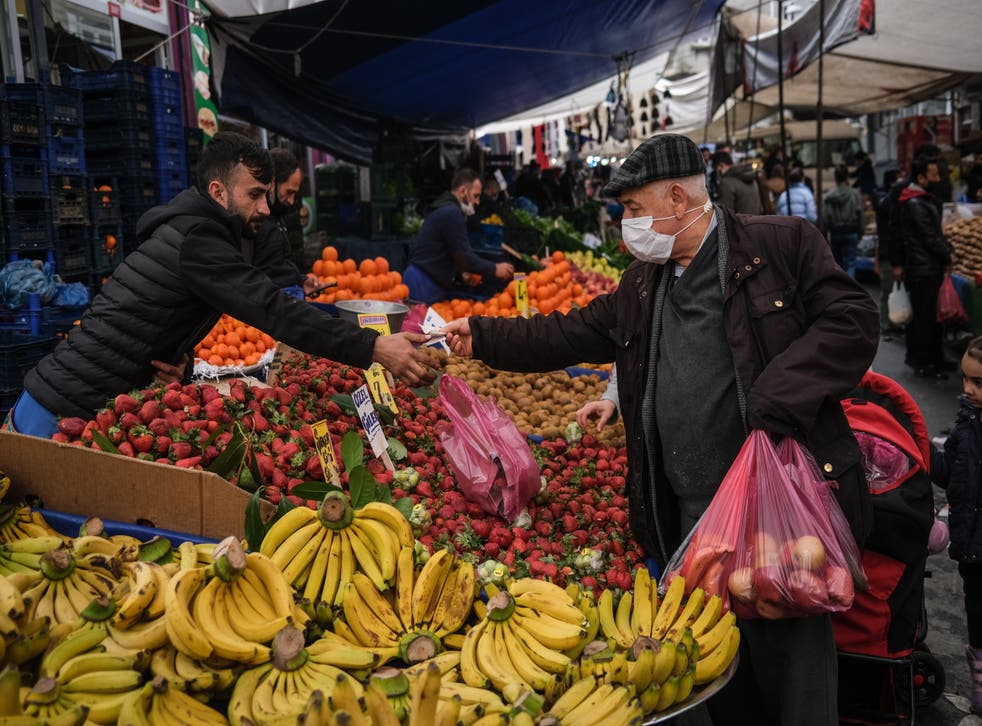[ad_1]
The steps included removing the reputable Central Bank governor and replacing him with an untested loyalist on Saturday, a move that triggered a plunge in the value of the Turkish lira to near-record lows before settling at about eight to the US dollar, down 15 per cent from the previous week.
Capital markets also tumbled, adding further pressure on an economy already reeling from the effects of the pandemic, depleted reserves and drastically reduced foreign investment.
In London, Paul McNamara, investment director at asset managers GAM, says: “The move suggests no understanding of how markets work and the limited tools Turkey has at its disposal.”
That same day, Ankara announced it would withdraw from the 2011 Istanbul Convention on violence against women, decrying the international agreement as a scheme to “normalise homosexuality” and not compatible with Turkey’s “social and family values”.
The rejection of the treaty prompted protests by women’s rights advocates concerned about persistent violence against Turkish women but pleased conservatives and traditionalists who make up Mr Erdogan’s base.
The weekend moves came days after authorities began a lawsuit to disband the country’s third-largest political party, the leftist, Kurdish-led People’s Democratic Party (HDP), accusing it of ties to the outlawed Kurdistan Workers Party (PKK). The court case prompted outcries by the US and officials in the West.
The moves come amid the backdrop of overall tepid economy and badly declining poll numbers for Mr Erdogan, his Justice and Development Party (AKP) and its junior ally, the far-Right Nationalist Movement Party (MHP).
Multiple polls over several weeks show Mr Erdogan’s coalition below 50 per cent popularity, with centre-Left and centre-Right opposition parties gaining ground and parties formed by former AKP leaders drawing at least five per cent support.
Selim Sazak, a political analyst affiliated with Ankara’s Bilkent University and Brown University in the US, says: “Erdogan’s political manoeuvring space is somewhat limited. He can’t ditch the nationalists. He can’t win over the Kurds and he has to solidify the base.”
Withdrawing the Istanbul Convention wins the approval of the cultural conservatives. Putting pressure on the HDP accedes to demands by the nationalists, who make a key part of Mr Erdogan’s coalition. One analyst close to the government says: “The MHP doesn’t ask for a lot but when they ask for something they expect it to be delivered.”
Getting rid of respected Central Bank governor Naci Agbal, who raised interest rates, tamed inflation and stabilised the lira, bolsters the prospects of exporters and manufacturers while hurting financiers, bankers and whittling down the savings of city dwellers.
High interest rates – despised by Mr Erdogan but demanded by economists to curb inflation – hurt the Anatolian export-oriented manufacturers who are an increasingly important part of his political base. High inflation, on the other hand, hurts the urban classes working in the finance and service sectors – members of the middle and upper-middle classes who have long voted against the AKP and Mr Erdogan.
To help out government supporters, Turkey’s trade ministry has announced a plan to “restructure” the debts of small shopkeepers.
Mr Sazak says: “It’s wealth redistribution. The blue-collar workers, Mr Erdogan will make sure they’re fine. He’ll make sure they’re taken care of with social welfare programmes.”

A market in Istanbul on Monday after Turkey’s currency lost nearly 15 per cent. President Recep Tayyip Erdogan sacked its central bank governor at the weekend
(EPA)
Mr Erdogan’s multi-pronged gambit to strengthen his grip on power is risky. The US, Germany and others have criticised Turkey’s decision to withdraw from the Istanbul Convention and its assault on the HDP.
US president Joe Biden said in a statement: “Countries should be working to strengthen and renew their commitments to ending violence against women, not rejecting international treaties designed to protect women and hold abusers accountable.”
Turkey’s weekend decisions have all but dissolved any diplomatic goodwill among Nato allies created by a recent easing of tensions with France over Libya and with Greece and Cyprus over eastern Mediterranean maritime disputes.
The moves could also backfire domestically by prompting mobilisation by women and Kurds that could hurt Mr Erdogan’s prospects in 2023 elections, or as some are speculating, early elections he may decide to call as early as mid 2021. Women’s rights groups have already called for a week of protests against the decision to reject the 2011 accord, in which European nations committed to taking measures to combat gender-based violence.
Turkey’s economy could further spin out of control. International investors that were once a pillar of Turkey’s formerly thriving economy have all but declared the country a no-go zone, exacerbating unemployment. Even government supporters said they were miffed by the moves to remove Mr Agbal. Turkish businesses and public entities are struggling to pay off $435bn (£311bn) in debts denominated in foreign currencies.
Ümit Özlale, vice-president of the opposition Iyi Party and a former adviser to the Central Bank, says: “Every businessman we talk to behind doors, they express their worries and negative opinions but in public they express very positive sentiments. The business community [is] under heavy pressure and cannot criticise government practices.”
But with the pandemic still draining the economy and at least two AKP offshoots gaining ground in the polls, Mr Erdogan may be calculating that now is the time to act.
Mr Sazak says: “If you expect poll numbers to go even further down, this is your moment. You kick out Mr Agbal. You pour money into the public programmes. You divide and confuse the opposition. Maybe you win elections in five or six months. He has the advantage but it’s very high risk.”
[ad_2]
Source link